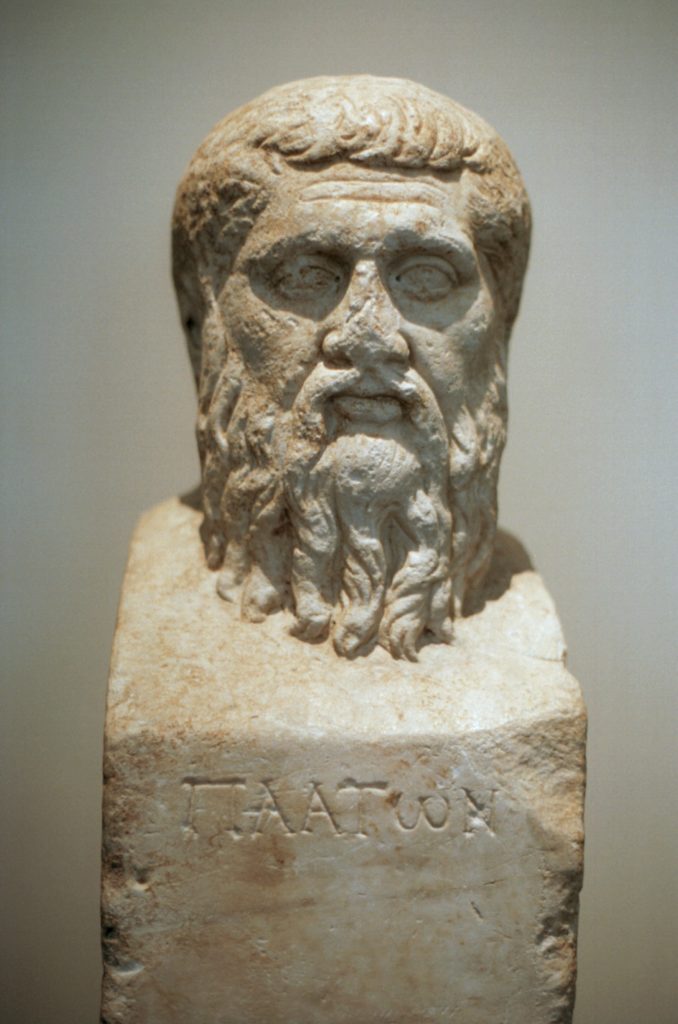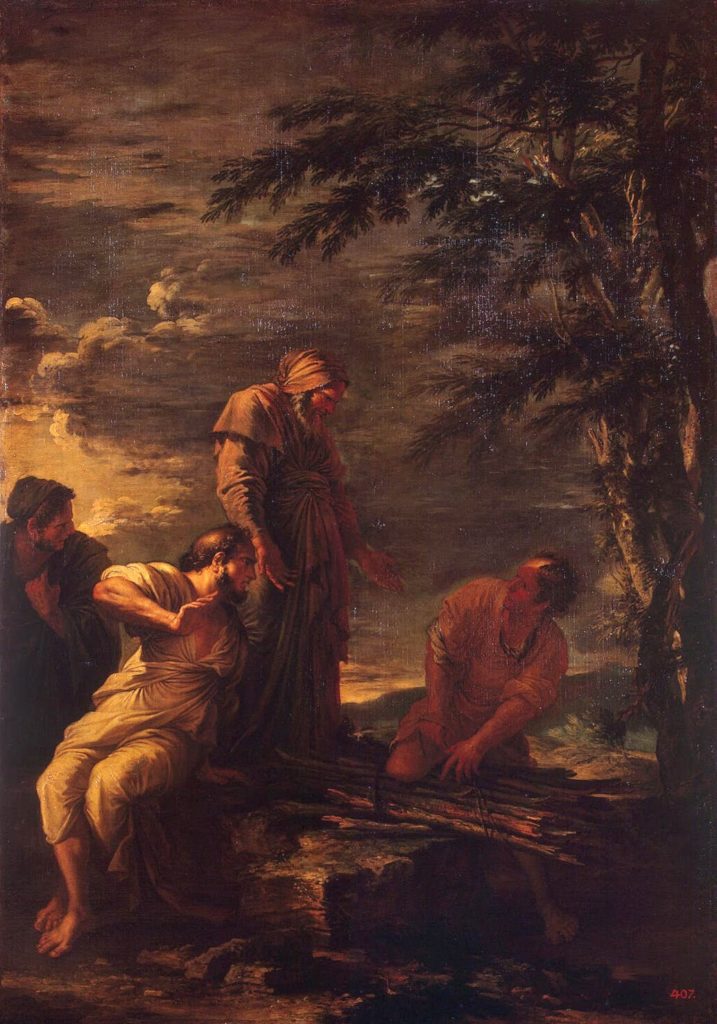
Herm of Plato
Wisdom of the Ancient Greeks
André Laks, Glen W. Most, Early Greek Philosophy, vols. I-IX, Loeb Classical Library, Harvard Press (2016)
The subject of philosophy is often labeled ‘The Great Conversation’, an on-going dialogue linking contemporary wisdom-seekers with the sages of the remote past. A number of books have been written on this topic. A few single-volume offerings of the last 75 years are of note: for example, B. Russell, A History of Western Philosophy (1945), G. Clark, Thales to Dewey (1957), A. Kenny, A New History of Western Philosophy (2010). Approaches to antiquity vary. Not all philosophers will agree today on what their objectives should be. But whatever research is done, it implies a study of the progress, and transmission, of knowledge.
Essentially this exchange of ideas entails a search for meaning(s). In ancient times this consisted of resolving issues related to any number of matters: i.e. arrangements in the heavens above, order in the earthly spheres below and debates on the internal nature of mankind and on his [or her] relations to external things. To the degree that philosophy’s earliest development is traceable, the distinction between theology and philosophy was small: either of them might have been a sub-division of the other. For ancient Greek thinkers and for intellectuals of neighboring traditions whose texts are available, behind all of what is visible stands an invisible being of might and intelligence.
In the last century and a half, that Greek presupposition has been replaced by a novel one that is no less presumptuous. Yet it is a theory which grants the likelihood of an answer that is wholly foreign to principal questions of early Greek philosophy, viz.: ‘what or who is the source of all that we see?’ The new hypothesis asserts that beings and entities exist on account of a process of creation which lacks any intelligence or personality, that the existence of all things is a result of ‘Chance’.
Prior to this theory’s rise to ascendancy, Aristotle’s forceful insights reigned for millennia. He decreed that ‘in every mortal by nature the invisible God becomes by those very works visible’ (De Mundo 6). Moreover, of organic principles of biological development, he stated that ‘if the technique of ship-building was in the wood, that we would have ships by way of nature’ (Physics 2). Old attitudes die hard. New ways of thinking require time to increase in popularity. Analytical philosophies nowadays have much in common: they proceed along secular lines of reasoning.
For some persons a cure for incredulity has arrived; but for others, justification for current cynical trends finally will be realized. It all depends on how the evidences are construed.
The recently published 9 volume Loeb edition of Early Greek Philosophy, edited and translated by André Laks and Glen Most (in a collaborative effort with Gérard Journee and with the assistance of Leopoldo Iribarren and David Lévystone), will not be read all the way through by many people. However, those who peruse its contents will not be displeased with the sagely wisdom contained therein: particularly if they enjoy discussions of theoretical metaphysics, epistemology or ethics. Quite a few ancient philosophers pursued wisdom with a view to its application to day to day affairs. From their perspective, if abstractions were not applicable to a human being’s conception of the nature of visible and invisible things, then what was the point of pondering elementary and complex matters? Objective answers to many of the ‘why’ questions are discoverable in this recent contribution to the Loeb Classical Library.
Volume one of the new Loeb edition contains ‘Introductory and Reference Materials’. Volume two: Beginnings and Early Ionian Thinkers, part 1; volume three: Early Ionian Thinkers, Part 2; volume four: Western Greek Thinkers, Part 1; volume five: Western Greek Thinkers, Part 2; volume six: Later Ionian and Athenian Thinkers, Part 1; volume seven: Later Ionian and Athenian Thinkers, Part 2; volume eight: Sophists, Part 1; volume nine: Sophists, Part 2.
This collection stands out. Syriac, Hebrew, Arabic and Armenian texts are incorporated, as well as inscriptions from two extraordinary documents: the Strasbourg Papyrus and the Derveni Papyrus. The presentation of each set of texts is clear. Where possible, readers are not left in the dark regarding an author’s biography, his doctrine and its reception in antiquity. The employment of specialist readers for certain chapters, and the use of so many proficient scholars for the preparation of this edition, ensures its immediate utility. The compilation’s durability might be debated in various forums; but one redeeming feature is the conversion of source-texts into English. They will exert great influence in modern studies of ancient philosophy.
There is space only to focus on a few issues. Volume one is rather thin on introductory material. The details of the historical setting are not spelled out; philosophy in ancient Greece and its districts require some sort of expositional essay if in fact these volumes truly are for the general reader, as is stated on more than one occasion. Hopefully one will be included in a revised volume before long. A brief Preface, an informative Note on Editorial Principles, Abbreviations, General Bibliography, comprehensive Concordance, Index of Names and a very useful Glossary are included.
There are scarcely any footnotes, except where “they are limited to factual information or indispensable clarifications” (p.5). This method of proceeding reverts back to the earliest productions of Loeb volumes where notes were in short supply and where editors shunned the creation of their own critical texts, adopting those of the German textualists. In this case, Laks and Most “worked on the basis of the collection of H. Diels and W. Kranz” (p.9). That was a practical way to proceed for sure. But with more than 30 specialist readers closely examining the texts, a genuinely critical text was attainable.
The extracts in these volumes are comprehensive. Ample use is made of quotations or paraphrases attributed to ancient Church Fathers. Plato figures largely in these texts. The compilation in volume two on ‘Reflections on Gods and Men’ is intriguing and was culled from many ancient sources. Writers of ancient tragedy are cited in that section: e.g., Aeschylus and Sophocles; but my question is simple, why omit excerpts of Euripides for this section? I had no inkling that someone could fill 6 pages about Pherecydes. The editors found enough interesting data to fill up 50.
The text-editors’ translation and prefatory comments merit discussion. Xenophanes is deftly handled. And I agree with the editors that “Heraclitus’ work with the Greek language is remarkable and distinctive”. His was an untrammeled use of communication. The editors’ Glosses of Heraclitus’ Greek are straightforward and usually reflect the original text. Altogether, the profitable matter on Heraclitus accounts for 224 pages of information. At D65 (vol. three) we have his popular maxim appearing in assorted ways:
- Homeric Allegories: ‘We step and do not step into the same rivers, we are and are not’.
- Cleanthes (in Eusebius, Evangelical Preparation): ‘It is always different waters that flow toward those who step into the same rivers’
- Plato, Cratylus: ‘[Socrates:] Heraclitus says something like this: that things flow and nothing remains; and comparing the things that are to the flowing of a river, he says that you could not step twice into the same river.’
- Seneca, Letters to Lucilius: ‘This is what Heraclitus says, “Into the same river we do and do not step twice.” For the name “river” remains the same, but the water passes by.’
Although the renderings are not idiomatic, the texts do illustrate how very old statements can be inscribed, and then later be recast by those utilizing them, for whatever purposes. Context is king, and it rules overtly; but its sovereignty is hindered often by reader-interpretation. In volume four, the life of Pythagoras can be perceived from nearly every possible angle. Great man that he was, scholars have misgivings about his originality, attributing many of his ideas to neighbors in eastern regions of the world.
In the text of Permenides there is an indiscriminate use of ‘mare’ and ‘horse’ for ίππος. One hopes that ‘mare’, a mature female horse, was not construed so simply because of the Greek word’s feminine form. The Greek text of Melissus (P5) is open to other interpretations and does not mean only that “He studied with Parmenides” (vol. five): again I agree with the editors when they say that such a meeting between the two persons was improbable. There is nearly 400 pages on Empedocles. Researches will thrill to have it all. The 35 line Strasbourg papyrus (B17) likely will garner praise. Below is the editors’ rendition of lines 14-20:
But come now, listen to my words: for learning
Will make your mind (phrenes) grow.
For as I already said, when I was indicating
clearly the boundaries of my words,
Twofold is what I shall say: for at one time they
grew to be only one,
Out of many, at another time again they,
separate to be many out of one,
Fire, water, earth, and the immense height of
air;
And baleful Strife is separate from them,
equivalent everywhere,
And Love (philotês) in them, equal in length and
in breadth.
The mains ideas are cosmological. The personifications of love, strife and joy are there to stimulate in readers’ explicit ambitions of a psychological kind, one of which is to grow the mind or to develop the processes of thinking.
Together with Empedocles, Protagoras was a renowned sophist whose repute has stood the test of time. Plato’s depiction of him undergirds the current fascination students have with him. A polymath of considerable ability, he could even get Aristotle out of bed for a dialogue since Protagoras was reputed to be skillful enough to answer all questions, especially those calling for explanations regarding virtue. As a result, in volume eight, 105 pages of text and data on him are included. Students and academics will not lack material for their assigned readings. All the volumes are of high standard. Nine volumes are a bit much for the average reader to inspect. The multi-volume publication comprises one very thick book accompanied by numerous slender ones. The impression cannot be avoided that this set should have been pared down to seven volumes. None the less, scholars, educated lay-persons, and other lovers of philosophy, who value the challenge of pitting the modern intellect against ancient ones, will want to match their wits against the brilliant minds in this anthology.
These volumes assemble much of the Greek scholarly largesse of generations past. They exhibit the cooperative reasoning that was shared by eminent figures. Once more these theorists are brought to life for pupils, not by means of a class-room lecture but this time in print. Indeed, it took individuals of similar genius and philosophical bent to assemble the material and to give voices to these dead men, to cause their hearts to beat anew in the breasts of modern beings. Their thoughts will animate a new breed of thinkers.

Democrites and Protagoras
Darrell Sutton is a pastor and writer who resides in the little village of Red Cloud, Nebraska (USA), where he composes poetry and publishes analyses of ancient Latin poems. He also issues reviews and academic papers on biblical and classical texts











We need a strong revival of respect for and interest in Greek philosophy and civilization.
It is now almost my only personal “inner immigration” apart from classical music away this awful world with its ever-intrusive horrors and inescapable problems.
Beware the extension of anti-fa iconoclasm to the “white” statues of ancient Greece and Rome on one hand, and the “black” claim on the other that the greatest human intellect was Afristotle and the greatest female beauty was Afrodite.
Incidentally, I am working with a Composer on the libretto for an Opera based on the Fourth Gospel which I believe was originally written like a drama for the Hellenist stage. Any comments on this project are welcome.